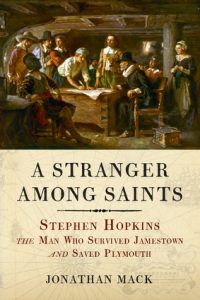 A Stranger Among Saints by Jonathan Mack traces the life of Stephen Hopkins, a colonist who spent 10 months stranded in Bermuda by a storm before eventually making it to Jamestown, where he spent six years before returning to England. He later signed on to another colonial venture, this time with a group of religious radicals on the Mayflower. Hopkins was the only member of the party who had been across the Atlantic before. Hopkins played a vital role in bridging the divide of suspicion between the English immigrants and their native neighbors. Without him, these settlers would likely not have lasted through that brutal first year.
A Stranger Among Saints by Jonathan Mack traces the life of Stephen Hopkins, a colonist who spent 10 months stranded in Bermuda by a storm before eventually making it to Jamestown, where he spent six years before returning to England. He later signed on to another colonial venture, this time with a group of religious radicals on the Mayflower. Hopkins was the only member of the party who had been across the Atlantic before. Hopkins played a vital role in bridging the divide of suspicion between the English immigrants and their native neighbors. Without him, these settlers would likely not have lasted through that brutal first year.
In our interview below, we asked Jonathan to answer a few questions about his writing process and what he wants readers to take away from Stephen Hopkins’s story.
A Stranger Among Saints traces the life of Stephen Hopkins, who spent 10 months stranded with the Sea Venture crew, during which he was charged with attempted mutiny and condemned to die—only to have his sentence commuted just before it was carried out. What do you hope readers will take away from reading Stephen Hopkins’s story?
What I found most interesting as I explored Hopkins’s life was learning how the decisions and actions of ordinary people could influence historical events. Hopkins’s mutiny presents an interesting example—the very same reasons why he rebelled against the Sea Venture leadership were adopted by some of the passengers on the Mayflower, creating a dispute that was ultimately resolved by the creation of the famous Mayflower Compact.
What was the most surprising thing you learned about Stephen Hopkins while researching his life?
Many people recall the role that Samoset played in the Pilgrim story. He was the first Native American to visit the Plymouth settlement. Though the English amicably spent an afternoon with him, they were nervous about allowing Samoset to spend the night and wanted him to leave as evening came. Samoset refused. Stephen Hopkins resolved the impasse when he invited Samoset to stay with him and his family, which helped pave the way toward peaceable relations between the two groups.
What was it like writing this book as a descendant of Stephen Hopkins?
The quirk of genealogy is what introduced me to Hopkins. My knowledge of the Pilgrims and Plymouth Colony was limited to what I’d learned in grade school, and I’d never heard of him until I stumbled upon his name on a genealogy website. The evidence of any ancestral connection was really weak at that point, but I was curious enough to start digging for information about this Mayflower passenger. What I found led to this biography, though it wasn’t until I’d written about three-quarters of the book that an actual relationship was confirmed. If my math is correct, Stephen Hopkins was one of my nearly 8,200 grandparents in that particular generation. So while there is a link, it’s only one in a tangle of thousands.
What was your greatest challenge in writing this book?
Because my understanding of Plymouth Colony and the other early English colonial efforts in America was very basic, I had to contend with an enormous vacuum of background information. In a way, though, my ignorance contributed to the production of this biography. Since so many of the fundamental details were unknown to me, I began to take notes as I was researching in order to keep the dates and facts straight. The notes eventually spilled onto page after page. At some point, I realized that a fascinating story was unfolding in the notes, so I organized them into what became a rough outline of chapters of this book.
What five people—living, dead, fiction, nonfictional—would you have over for a dinner party and why?
This is a difficult question for me, as I tend to shy away from most parties. Aside from a family gathering, I suppose I’d really like to sit down with Samoset, Squanto, and Massasoit, three of the Native Americans who played integral roles in the establishment of Plymouth Colony and, therefore, in the shaping of what’s become modern America. What we know about these men and their lives comes almost exclusively from the Pilgrims. Those firsthand accounts would naturally have been biased by their own perspectives. I wish I could talk to the three men and learn more about their views of the interactions with this early wave of English immigration to their ancestral lands. Separately, I think it would be fascinating to meet with J. R. R. Tolkien, author of The Hobbit and The Lord of the Rings trilogy, and Andy Summers, the English guitarist and member of rock band the Police.
No Comments
No comments yet.